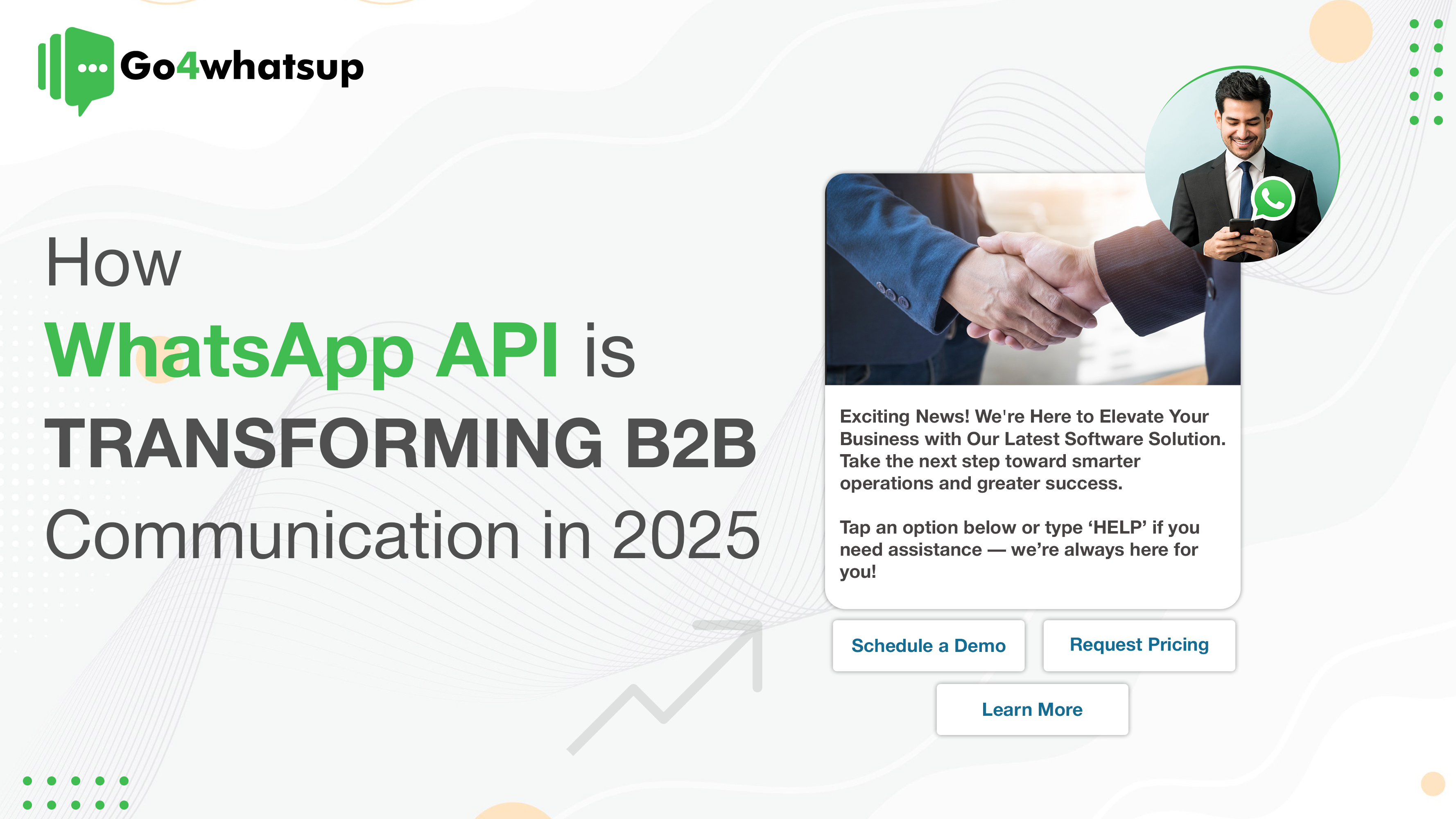
B2B communication in 2025 is no longer about emails that go unopened or calls that go unanswered. Businesses today need instant, secure, and scalable communication channels that align with how decision-makers actually communicate.
This is where the WhatsApp Business API is transforming B2B communication.
With over 2 billion global users, WhatsApp has evolved from a personal messaging app into a mission-critical enterprise communication platform. In 2025, forward-thinking B2B organizations are using WhatsApp Business API to automate conversations, shorten sales cycles, improve customer support, and drive measurable ROI.
In this guide, we’ll explore:
- Real B2B communication challenges
- How WhatsApp Business API solves them
- Industry-specific use cases
- Real-time examples
- Future trends
- FAQs optimized for SEO
- Conversion-focused next steps
The Biggest B2B Communication Pain Points in 2025
Before understanding the solution, let’s address the real problems businesses face today.
❌ 1. Low Email Engagement
- Average B2B email open rates: 20–25%
- Delayed responses slow deal velocity
- Important updates get buried in inboxes
❌ 2. Disconnected Communication Tools
- CRM, helpdesk, and messaging tools don’t sync
- Sales and support teams lack conversation context
- Manual follow-ups lead to missed opportunities
❌ 3. Slow Customer Support
- Long ticket resolution times
- Repetitive queries overload agents
- Poor post-sales experience increases churn
❌ 4. Lack of Personalization at Scale
- Generic communication frustrates B2B buyers
- Hard to personalize messages across regions
- Multi-language support is expensive
? This is exactly where WhatsApp Business API excels.
What Is WhatsApp Business API?
The WhatsApp Business API is an enterprise-grade messaging solution designed for medium and large businesses to communicate with customers at scale.
Unlike the WhatsApp Business App, the API allows:
- Automation via chatbots
- CRM & ERP integration
- Multi-agent access
- Secure, compliant messaging
- High-volume notifications & conversations
It is not a standalone app — it’s a backend communication infrastructure that integrates directly into your business systems.
Key Features That Make WhatsApp API Ideal for B2B
1️⃣ Automated & Trigger-Based Messaging
Businesses can automate:
- Lead confirmations
- Demo reminders
- Order & invoice updates
- SLA notifications
? Real Example:
A SaaS company sends automated demo reminders and follow-ups via WhatsApp, reducing no-shows by 38%.
2️⃣ CRM & ERP Integration
WhatsApp API integrates with:
- Salesforce
- HubSpot
- Zoho
- Custom CRMs
This ensures:
- All conversations are logged
- Sales teams have full context
- Zero manual data entry
? Real Example:
A B2B logistics firm integrates WhatsApp with its CRM to track shipment updates, reducing support tickets by 42%.
3️⃣ Multi-User & Team Inbox
- Multiple agents manage one WhatsApp number
- Assign chats to departments
- Track response times
Perfect for:
- Sales teams
- Customer support
- Account managers
4️⃣ Secure & Compliant Communication
- End-to-end encryption
- Verified business profiles
- Opt-in based messaging
This is critical for:
- Finance
- Healthcare
- Legal & compliance-driven industries
5️⃣ Rich & Interactive Messaging
WhatsApp supports:
- Buttons
- PDFs
- Videos
- Catalogs
- Payment links
This makes B2B conversations action-oriented, not informational.
Industry-Specific B2B Use Cases (With Real Examples)
? Banking & Financial Services
Pain Point: Secure customer communication & delayed approvals
Solution: WhatsApp API enables secure alerts, KYC updates, and instant support.
? Example:
A financial institution uses WhatsApp to send loan approval updates, cutting turnaround time by 50%.
? Healthcare & Pharma
Pain Point: Missed appointments & compliance risks
Solution: Automated reminders, reports, and post-consult follow-ups.
? Example:
A hospital network reduced appointment no-shows by 30% using WhatsApp reminders.
? SaaS & Technology Companies
Pain Point: Long sales cycles & poor onboarding
Solution: Automated onboarding flows, feature updates, and renewal reminders.
? Example:
A SaaS brand increased trial-to-paid conversions by 27% using WhatsApp onboarding sequences.
? Manufacturing & Logistics
Pain Point: Lack of real-time updates
Solution: Shipment alerts, order tracking, and vendor communication.
? Example:
A logistics provider reduced inbound support calls by 45% using WhatsApp updates.
Why WhatsApp API Delivers Higher ROI Than Email or SMS
| Channel | Open Rate | Engagement | Personalization |
| 20–25% | Low | Medium | |
| SMS | 90% | Low | Low |
| WhatsApp API | 98% | High | Very High |
WhatsApp combines the reach of SMS, richness of apps, and personalization of CRM.
Future Trends of WhatsApp Business API in 2025 & Beyond
? AI-Powered Conversational Automation
- Context-aware chatbots
- Predictive responses
- Lead qualification via AI
? WhatsApp Payments for B2B
- Invoice sharing
- Payment reminders
- Transaction confirmations
? Hyper-Personalized Messaging
- Behavior-based triggers
- Industry-specific workflows
- AI-driven recommendations
FAQs
Is WhatsApp Business API suitable for B2B companies?
Yes. WhatsApp Business API is ideal for B2B companies needing scalable, secure, and automated communication with clients, partners, and vendors.
How is WhatsApp API different from WhatsApp Business App?
The API supports automation, CRM integration, multi-agent access, and high-volume messaging, unlike the basic app.
Can WhatsApp API integrate with CRM systems?
Absolutely. WhatsApp API integrates seamlessly with CRMs like Salesforce, HubSpot, and Zoho.
Is WhatsApp Business API secure for enterprises?
Yes. It offers end-to-end encryption, verified business profiles, and opt-in compliance.
What industries benefit most from WhatsApp API?
Banking, healthcare, SaaS, manufacturing, logistics, education, and real estate see the highest ROI.
Final Thoughts
In 2025, B2B communication is about speed, trust, automation, and personalization. The WhatsApp Business API delivers all four — making it one of the most powerful tools for modern enterprises.Businesses that adopt WhatsApp API today aren’t just improving communication — they’re future-proofing growth.
? Ready to Transform Your B2B Communication?
Talk to a WhatsApp Business API expert today and see how automation can reduce costs and increase conversions.


